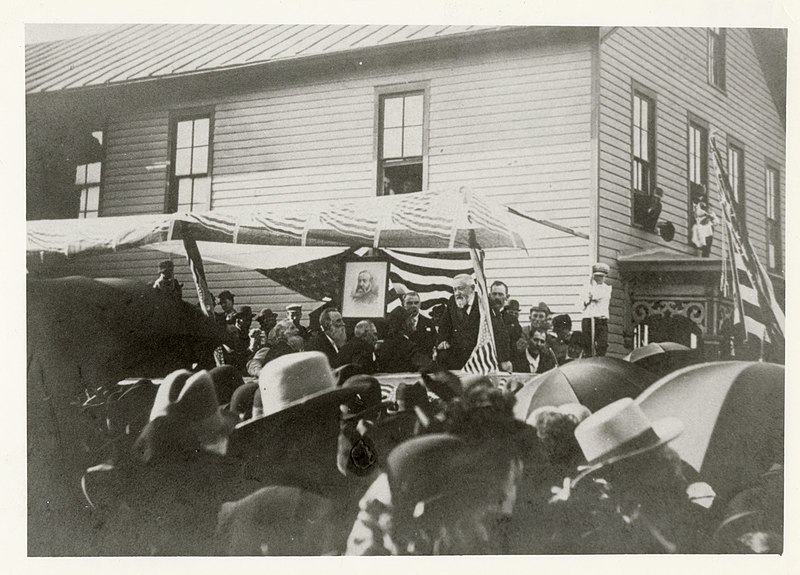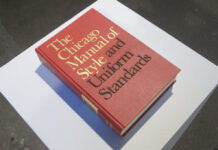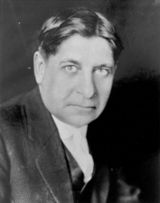Aberdeen, South Dakota. I suspect if you took the temperature of Porchers regarding the looming 2024 election, the reading would be reminiscent of January in South Dakota. Porchers are an eccentric lot under normal circumstances. The two dominant parties have little to offer those of distinctly localist sensibilities. Add to that the rather deficient personalities of likely nominees Joe Biden and Donald Trump, and it’s enough to send the most abstemious Porcher to their local microbrew. Or in my case locally distilled Scotch (well, local to Moray, Scotland).
Options are few. One could choose not to vote. That itself is a statement. If our major parties cannot come up with minimally qualified candidates, we should not feel obligated to make a choice. One might vote for other candidates or ballot measures down ballot while refusing to vote on the presidency.
The other temptation is to vote for a third-party candidate. One must admit that this is a virtual equivalent to throwing away one’s vote. For all sorts of reasons, minor-party candidates have almost no chance of actually being elected president. They struggle mightily to even make the ballot in most states. Further, the impression that they can’t win makes it difficult for them to raise money, and the difficulty raising money leads to the impression they can’t win. A vicious cycle, indeed.
It has been since 1968 (George Wallace) that a minor-party candidate earned an electoral vote (Wallace won five states and forty-six electoral votes). The last credible minor-party candidate was Ross Perot in 1992. Perot garnered 19% of the vote but failed to win a single state (he finished second in Maine). There was a brief Gary Johnson bubble in 2016, but that quickly popped when Johnson forgot what Aleppo was and failed to qualify for any debates (one of the ways in which the system is stacked against minor parties). What tends to happen to minor-party candidates is that while they may, under certain circumstances, have an initial popularity, voters quail at the thought of voting for a sure loser as the election looms closer, and minor-party-curious voters tend to drift toward the major party candidate closest to them. Thus this memorable Simpsons bit. Still, voting third-party can be a protest vote, just like not voting at all.
Given this dismal state of affairs, I can sympathize with Teddy Macker’s enthusiasm for Robert F. Kennedy, Jr. I don’t share this enthusiasm, but I don’t judge it harshly. Sure, I think America has had enough of the Kennedys. Armed with knowledge of that family’s many pathologies, I would hesitate to give any more power to a representative of that clan. Many of the experiences that Mr. Macker points to as giving Robert Kennedy a unique perspective are experiences he had only because he was a rich American aristocrat. Furthermore, I think the United States suffers from a pathological mixing of celebrity and politics. Let’s be honest. If his name was Robert F. Pelowski, no one would think of Mr. Kennedy as presidential material. Add to that the celebrity wife, and I think we have more a celebrity boomlet than a serious presidential candidate. And, sure, I have my policy differences with him. So, on the whole, I am not convinced.
I must say, however, flaws and all, I think I’d take Mr. Kennedy over the two likely major party candidates. But it must also be said that this is an extraordinarily low bar. Being a better candidate than Donald Trump or Joe Biden is a little like being the fastest three-toed sloth.
A healthy democracy does not get itself into this situation. There is not enough space to fully analyze the many pathologies of American politics, but I gave a TEDx talk that offers at least one explanation of the problem a few years ago. In brief, our politics are so bitter in part because our parties are too weak. Parties have little ability to say who runs under the party label. To give just one example, I am pretty sure that if the Republican party leadership would have had its druthers in 2016, Donald Trump would not have been the party nominee. Here’s a guy who was barely a Republican (in fact he’d been a Democrat a few years before and had given money to many Democratic politicians). That same year Bernie Sanders, who had to change his party registration to run for the Democratic nomination (he had been registered as a Socialist), almost won that nomination. So, you have a guy who isn’t really a Republican winning the Republican nomination and a guy who isn’t really a Democrat almost winning the Democratic nomination. That is evidence of weak parties.
Weak parties are susceptible to extreme candidates who take advantage of party weakness to run shallow, populist campaigns. These people seem fun. They appeal to our political id, mostly in the way they make fun of everyone who opposes them, and encourage us to fester in our (often reasonable) frustrations and anger. We get more ideologically extreme candidates who are more willing to reject the norms of civility in favor of political spectacle and negativity.
The media landscape does not help. As media has fragmented, each outlet appeals to a smaller, more ideologically monolithic audience. That itself promotes more of the pathologies just listed above. It is a sad comment on human nature, but people respond to fear and negativity. Media outlets have every incentive to “nutpick” the other side, finding the loosest cannons in the opposition and scaring the pants off readers or viewers at the thought those evil people (say, Alexandria Ocasio-Cortez or Marjorie Taylor Greene) might actually get power.
We have had geographical sorting as well. People are more likely to move to places where they will find ideological harmony with their neighbors. The COVID moment enhanced this in two ways. First, frustrated one way or another with their state’s response to the pandemic (normally thinking it was too harsh), many people left for states that were considered freer. I personally know people who moved to my little town precisely for this reason. Also, COVID put the work-at-home trend on warp speed. People no longer feel like they have to live in a particular place for work. So if you find your place ideologically unfriendly, move to a friendly place without having to change jobs.
Add this all up and we are very polarized with a dearth of civility. The phenomenon is self-reinforcing. Because everyone in the other party is evil, I can’t let them get any power or that will mean the “end of America as we know it.” I have been voting in presidential elections since 1992. I’ve been told every time that this is “the most important election of our lifetime.” You know, it really did not matter who won in 1996. I recall after the 2008 election people thought Barack Obama was ushering in a new era of Democratic dominance. That era lasted all of two years, when the Democrats got whacked in the 2010 midterm elections. Things are not really as dire as either side thinks. Nevertheless, because of the polarization of our politics, we get the impression that we cannot let the other side get even the slightest foothold on power. This only adds to the fear and anxiety, readily exploited by the increasing number of demagogues in our politics.
I don’t know that I see much of a remedy in the short run. It would contribute to the health of the republic to purge Donald Trump from the scene, but that will take some time to do. One assumes an election defeat in 2024 might just do it. Or we have to wait until 2028, should Trump be successful. We need to get back to the normal political disliking of each other, not the bitter, divisive, demagogic politics of the last seven years or so. Trump’s pathologies are well documented. In addition to his own failures, he encourages bad behavior on the part of Democrats (and the media, if that is not a redundancy) who think that in opposing Donald Trump one may use any means necessary. We can hold out hope that a post-Trump, post-Biden era will mark a return to regular partisanship: tough, hardball politics, but with some semblance of civility, some notion of the commonwealth, i.e., that we, as Americans, actually have something in common. We won’t always agree. Indeed, disagreement comes naturally. But we must disagree as neighbors, not as enemies.
I wish I could be more optimistic, but I fear that for the next four to five years we are in for more of the same. If it is true that, as Otto von Bismarck once said, God shines on fools, drunks, and the United States of America, perhaps we may get lucky and things will turn out better in 2024 than seems likely right now. Who knows, maybe we’ll elect Robert F. Kennedy, Jr. We could do worse. We probably will. Cheers!
Image credit: via Wikimedia Commons













What a strange article. The word “pathology” appears 5 times. That seems to reinforce my impression that Jon is circling the wagons in defense of mediocre normalcy. Instead of seeing innovation and “new blood” as a sign that a political party is vibrant, he unequivocally calls it “weakness”, which I suppose befits his pseudo-medical pretense of analyzing “pathologies”.
FYI:
1. TR came in second, not third, running as a third-party candidate in 1912. The winner was Democrat Wilson who promised to keep us out of ww1. When he changed his mind, he got director Ince to redo the ending of the film Civilization to show Jesus on the side of war instead of peace.
2. Saying that RFK Jr. did what he did because he was rich seriously lacks context. What should a wealthy person do instead? Join a club and play golf, frantically trying to protect one’s wealth by chatting about “disturbing” trends in society? He made the most of his upbringing — replace “we” with “he” in the title of this essay.
3. Voting third-party is not throwing away your vote. It is demonstrating to the party leaders that they are both not providing acceptable candidates. That is a form of feedback, and has been important at various times in history (#1 above).
4. Telling people not to vote (e.g., “blank ballot”) is illegal in Indonesia. Meanwhile in Singapore, if you skip an election by not voting, you have to re-register in order to be eligible to vote in the next one. Our system allows the basic “no confidence” dissent of withholding your vote, which is actually a privilege, globally speaking.
5. “Lesser of two evils” decision-making is cynical, and generally shows a sad conformity to the hyped polarization that Jon rightly criticizes in this essay. Every election is “dire” or “urgent” or “saving us from evil” which is what each side now says about the other, as I noted back in 2020:
https://www.frontporchrepublic.com/2020/10/millennials-you-dont-have-to-vote-for-the-lesser-of-two-evils/
This didn’t start with Trump. Trump was a reaction to 8 years of Obama’s indelible and corrosive change on the US, and the potential of 8 more under Hillary.
Blaming Trump is “year zero” thinking, as if he arrived ex nihilo.
Comments are closed.